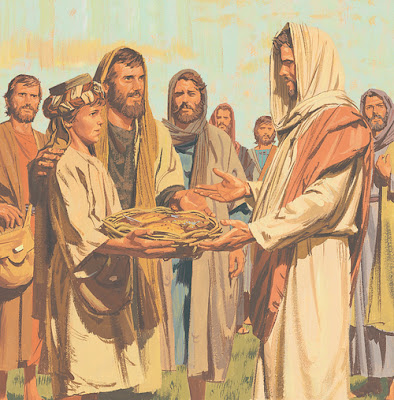A BETTER WORLD, A SELFLESS WORLD.
July 25, 2021
Seventeenth Sunday in Ordinary Time – B.
A Tibetan proverb says: “To change the world we must first
change ourselves.” And an Igbo proverb adds: “The world is like the udder of a
goat. It doesn't propel milk unless you punch and squeeze it.”
We all dream of a better world, or of this world to become
the best place to be, where everyone can get what he needs and when he needs,
and maybe, help others to find what they also need. But that dream cannot be
possible unless each one of us fights from deep within the virus of selfishness
and egocentrism. Our societies and this world will become a perfect place where
reign unity, harmony, and unblemished peace only when we will deepen our sense
of concern not for oneself alone but mostly for others.
Our families, societies, and even the Church, are built on
our diversities. Those diversities, when put together become the greatest
riches we have and lead to unity. Unity, we can feel it in filigree is the main
message of this 17th Sunday in the Ordinary Time of the year B. We are all fed
with the same bread in order to become one same family, the family of the
children of God. That is also what the Holy Eucharist does of us: One bread,
one body, one people, one hope, one better world.
The Catechism of the Catholic Church has a beautiful article
about unity in diversity. It says, “From the beginning, this one Church has been
marked by a great diversity which comes from both the variety of God's gifts
and the diversity of those who receive them. Within the unity of the People of
God, a multiplicity of peoples and cultures is gathered together. Among the
Church's members, there are different gifts, offices, conditions, and ways of
life. "Holding a rightful place in the communion of the Church there are
also particular Churches that retain their own traditions." The great
richness of such diversity is not opposed to the Church's unity. Yet sin and
the burden of its consequences constantly threaten the gift of unity. And so
the Apostle has to exhort Christians to "maintain the unity of the Spirit
in the bond of peace."” CCC 814.
The temptation, hearing the first reading and the Gospel
will be to talk about the multiplication of loaves of bread or the miraculous
feeding of a huge number of people with very few resources. But actually, the
invitation is to look beyond the miracles and see the work of God to bring the
many people into one unique family of mutual concern and care, a place and
family where what one has is given to feed the needs of many and all.
In the first reading, upon recommendation of the Prophet
Elisha, hundred people are fed with only “twenty barley loaves made from the
first fruits, and fresh grain in the ear.” And the surprising part is that
“when they had eaten, there was some leftover.”
In the Gospel, something similar happens. Jesus feeds about
five thousand men with five barley loaves and two fish and still, twelve wicker
baskets are filled with fragments from the five barley loaves that had been
more than they could eat.
Through these signs, the multiplicity and diversity of those
who were fed, either on the time of Elisha, or on Jesus’ time are brought to share
the same table, and so become one unique eucharistic body.
Speaking of the reality of the Eucharist, one beautiful
expression we often use is communion. It actually speaks of something that puts
us together to make a common unity. The Eucharist is the sacrament of community
and life together as one. At the Eucharistic banquet, all our diversities are
brought together and a family is born, united by the same purpose.
If we truly dream of a better world where every one of us
will feel at home and have what he or she needs, we must first run for unity.
For, where there is perfect unity, no one claims for his own an exclusive
possession of what he has. In a united and communitarian place, people are
rather eager to put all together, to bring the little that they have for the
sharing of the many that we are. The better world, we said ahead, is a world
without selfishness, egoism, greed, and all kinds of thirst that put the
personal interest at the first position.
St. Paul, in the second reading, shows us a way to build the
dreamed better world. He exhorts each of us, Christians, saying: “Brothers and
sisters: I, a prisoner for the Lord, urge you to live in a manner worthy of the
call you have received, with all humility and gentleness, with patience,
bearing with one another through love, striving to preserve the unity of the
spirit through the bond of peace.”
Without humility, gentleness, patience, mutual
understanding, unity, and peace, our societies and families will only be
aggregations of people, places where people live one beside or near another one
without any concern for the neighbor. In a selfish and indifferent environment,
may the brother next to me die or live, that does not affect me. As Christians
and true disciples of Christ, we cannot live that way. The question of Jesus to
his disciples in the Gospel is also addressed to us: “Where can we buy enough
food for them to eat?” The Lord wants to provide for the needs of our brethren,
and He calls us to work towards that end. One thing to finish, if you dream of
this world to become a better world, work at its transformation. Start changing
your perception of things first. Nourish generosity and selflessness.





Comments
Post a Comment